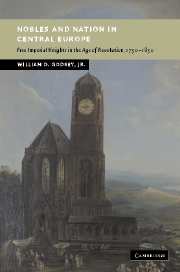Book contents
- Frontmatter
- Contents
- Preface
- Abbreviations
- Introduction
- 1 Wealth and noble autonomy: the Free Imperial Knights in Mainz on the eve of revolution
- 2 Nobles becoming Germans: the transformation of a concept
- 3 Nobles becoming Germans: the destruction of a “geo-cultural landscape”
- 4 Between destruction and survival: knights on the Middle Rhine 1750–1850
- 5 The past recaptured: knights in the Hapsburg Empire 1792–1848
- 6 From cathedral canons to priests: the Coudenhoves and the “Catholic revival”
- 7 The beginnings of conservative German nationalism: the “naturalization” of Baron Carl vom und zum Stein (1757–1831)
- Conclusion
- Appendix: Families of Free Imperial Knights (1797)
- Bibliography
- Index
1 - Wealth and noble autonomy: the Free Imperial Knights in Mainz on the eve of revolution
Published online by Cambridge University Press: 01 October 2009
- Frontmatter
- Contents
- Preface
- Abbreviations
- Introduction
- 1 Wealth and noble autonomy: the Free Imperial Knights in Mainz on the eve of revolution
- 2 Nobles becoming Germans: the transformation of a concept
- 3 Nobles becoming Germans: the destruction of a “geo-cultural landscape”
- 4 Between destruction and survival: knights on the Middle Rhine 1750–1850
- 5 The past recaptured: knights in the Hapsburg Empire 1792–1848
- 6 From cathedral canons to priests: the Coudenhoves and the “Catholic revival”
- 7 The beginnings of conservative German nationalism: the “naturalization” of Baron Carl vom und zum Stein (1757–1831)
- Conclusion
- Appendix: Families of Free Imperial Knights (1797)
- Bibliography
- Index
Summary
“… incurring debt was [Baron Seckendorff's] favorite pastime …”
Canton Gebirg to Imperial Aulic Council, Jul. 18, 1771, HHStA, RHR, Ob.Reg., 1473/1.Perhaps the most notable cause célèbre in the late Holy Roman Empire both concerned the material circumstances of a legendary family of Free Imperial Knights and exemplified the problem of debt among early modern nobles generally. In the early fall of 1783 the decade-long imprisonment of Count Carl Sickingen-Sickingen (1702–84) by his two sons became public knowledge, creating a sensation immortalized by Schiller in his play The Robbers. The captivity itself, rather than its long history and complicated circumstances, has drawn the attention. Sickingen was held under close if luxurious confinement from the end of 1771 to 1783 in Sauerthal, a property of the family in the Valley of the Rhine (Rheingau) not far from Rüdesheim. His sons, one of whom was a former minister of government in Mainz, had allowed him neither unrestricted access to visitors nor the right to correspond freely. His daily activities, moods, and the state of his health were monitored and minutely recorded by his secretary, who was in the sons' pay. Though Sickingen apparently suffered from mental instability, possibly megalomania, he was not deceived about his miserable predicament or about the culpability of his offspring. Less known, however, is that the Imperial Aulic Council provisionally sanctioned the detention even after it had aroused public indignation and that the count died in December 1784 still a prisoner of his sons.
- Type
- Chapter
- Information
- Nobles and Nation in Central EuropeFree Imperial Knights in the Age of Revolution, 1750–1850, pp. 16 - 47Publisher: Cambridge University PressPrint publication year: 2004



